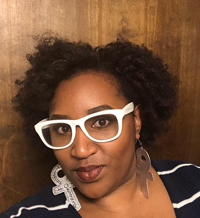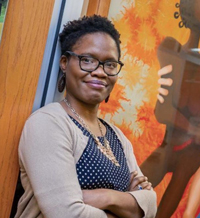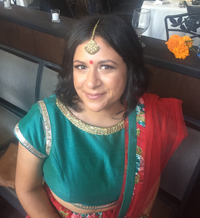Liberating Restorative Justice from Co-optation within Colleges and Universities
With this webinar, we continue to highlight and promote the new book, Colorizing Restorative Justice: Voicing Our Realities edited by Edward Valandra (Living Justice Press). Dr. Desirée Anderson’s compelling essay in that volume, “Co-opting Restorative Justice in Higher Education” provides the foundation for this session.
The system of white supremacy is a part of every interaction we have as human beings and influences the ways in which we participate and show up in all spheres of life. Like other institutions, white supremacy has impacted the implementation of restorative practices in educational institutions. Patterns of structural and institutional co-optation rooted in white supremacy and colonialism prevent restorative justice/restorative practices from being truly transformational. Additionally, by expecting restorative justice to solve problems that institutions neglect, the work gets watered down and the potential for restorative justice to be a mechanism for both individual and social justice gets lost in the process. Decolonizing the use of restorative justice within institutions is the only way to address systemic harm and oppression and the ways in which this influences interpersonal harm and conflict. Desirée Anderson, Neijma Celestine-Donnor, and Satya Chima engage in a conversation about the ways in which practitioners may use restorative justice and restorative practices to address issues of structural harm while keeping in mind the ways in which colonization and white supremacy may infiltrate facilitator practice. They will also address the use of RJ within higher education as a response to bias incidents and other conduct that reflects systemic marginalization and oppression within institutions.
The discussion will include:
- Strategies for RJ practitioners to take into account how the institutions through which we operate can advance or hinder RJ as a transformational and anti-racist approach.
- Foundational principles, elements, and ethics when engaging in restorative practices to address issues of incidental and structural harm on college and university campuses.
- Ways of thinking about the role of the facilitator and being sensitive to racial trauma when addressing issues of bias, equity, and inclusion within institutional settings..
- How to critically reflect on your own social location to prevent and/or minimize the co-optation and watering down of restorative justice and restorative practices.
Guest Bios
 Dr. Desirée Anderson (she/her)
Dr. Desirée Anderson (she/her)
Desirée Anderson was born in San Diego, California. The child of Naval personnel, she had the pleasure of living in Belgium for five years where she also attended High School. Desiree returned to the United States to live in Louisville, Kentucky where she completed both her Bachelors and Masters Degrees from the University of Louisville. Having worked in higher education for over 12 years, Dr. Desirée Anderson has committed her energy to address issues of bias and hate on college and university campuses. She earned her Ph.D. from the University of New Orleans researching The Use of Campus-Based Restorative Justice Practices to Address Incidents of Bias: Facilitators’ Experiences. Before coming to serve as the Associate Dean of Diversity and Student Affairs at the University of New Orleans, she worked as the Director of the Intercultural Center at Saint Mary’s College of California and previously held positions as the Associate Director of Multicultural Affairs at Tulane University and as an Area Residence Director at Texas State University. Desirée also serves as a Restorative Justice National Team Trainer for the Center for Restorative Justice at the University of San Diego and is just released a book chapter in Colorizing Restorative Justice by Living Justice Press. In her free time, she enjoys reading, singing, dancing, and watching an unnecessary amount of TV.
 Neijma Celestine-Donnor (she/her)
Neijma Celestine-Donnor (she/her)
Ms. Celestine-Donnor is a proficient leader with over ten years of experience in higher education including strategic planning, program development, facilitating, assessing, conflict resolution and counseling. She is committed to advancing diversity, equity, inclusion for minoritized populations and balancing the values of free speech. Currently, she is an Assistant Dean for DEI at the University of Maryland Baltimore. She formally served as the director for Bias Incident Services at The University of Maryland. In that role, she provides individual and systemic trauma informed outreach, advocacy and support for all campus members including underrepresented and marginalized students, staff and faculty impacted by acts of bias, hatred, and identity-based violence. Ms. Celestine-Donnor holds a Master's Degree in Social Work from the University of Maryland and is a licensed trauma clinician. She is currently completing her JD at the University of Baltimore Law School. She is an adjunct professor at the University of Maryland and an experienced trainer and facilitator. She is a proud immigrant and lives with her partner and two sons in Baltimore.
 Satya Chima (she/her/they/them)
Satya Chima (she/her/they/them)
Satya Chima (she/her/they/them) identifies as a queer, bi-racial, woman of color with a disability. Satya graduated from the University of California, Santa Cruz with a Bachelor of Arts in Feminist Studies with an emphasis on Law, Politics and Social Justice. She has served various marginalized and underrepresented student populations, such as students of color, first generation students, students from low socioeconomic statuses and LGBTQIA individuals at both the high school and collegiate level. She currently serves as the Supervisor of Equity Programs at American River Community College in Sacramento, California, overseeing four equity centers and basic needs resources and services. Prior to this role, she served as the Bias Response and Advocacy Coordinator at UW-Madison where she worked on supporting and advocating for students who experienced bias or hate incidents through trainings with staff and faculty, support meetings for victims, and educational conversations with respondents. She has experience working with transformative and restorative justice initiatives around issues of interpersonal conflict, racism and white supremacy. She has also facilitated numerous social justice trainings and restorative conversations with an emphasis on identity development, racial justice and healing.
Mikayla Waters-Crittenton-McCray
Mikayla Waters-Crittenton-McCray serves as the Assistant Director of Student Accountability and Restorative Justice and as a Residence Director for Eastern Mennonite University. Prior to joining the EMU team, Mikayla worked to advance the awareness, and research around restorative practices in the context of domestic violence, intimate partner violence, and sexual violence at Impact Justice. Mikayla trained national organizations across the U.S. in restorative justice and is a certified rape crisis counselor. She earned an MA in Restorative Justice from Eastern Mennonite University and her undergraduate degrees in Criminal Justice and Sociology from Mary Baldwin University.


